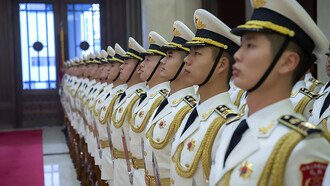Henry Kissinger, a faithful representative of the realist theory of the international system, argued that, since the Congress of Vienna in 1815, the periods of world order have been shrinking. Since the end of the Great War (1914 -1918) Europe has seen the flowering of idealism and utopian dreams of peace, which were reflected in President Wilson's doctrine and the creation of the League of Nations in 1920, which the United States could not join because the Senate did not approve it. It took only 21 years for the Second World War to break out, which at its end gave rise to the current International Order born at the San Francisco conference in 1945 and which established the United Nations under the preamble “We the peoples determined to save succeeding generations from the scourge of war...” after the horror of the two world conflicts.
In 2025, it will be 80 years since the creation of the United Nations and it is very difficult to argue that it has fulfilled the mandate of its founding charter. Federico Mayor Zaragoza, recently deceased former director general of UNESCO and tireless fighter for peace and human dignity, argued that, until a few decades ago, “‘We the peoples’ did not exist and were fearful, obedient, silent, and silenced”. Today, although “the peoples” can speak, their voice is not sufficiently heard, despite the numerous initiatives that the United Nations has undertaken that are beneficial to humanity in the economic and cultural spheres and in the defense of human rights.
Today, the international order is seriously weakened. Its structure, dominated by five countries entrenched in the Security Council, has been overtaken by the violent reality of the 21st century. In the war that began in February 2022 with the Russian invasion of Ukraine, the official figures of military and civilian dead and wounded are not known, but they are estimated to be well over a couple of hundred thousand.
Faced with a mega attack by the Hamas terrorist group in Israel, which left 1,200 dead and 250 people kidnapped in 2024, the government has responded with a war of destruction and annihilation in the Gaza Strip where more than 45,000 people have been massacred, mostly defenseless women and children.
In the Middle East, the sovereignty of the states created by the British and French when the Turkish empire disappeared in 1918 no longer exists. Syria, Lebanon, and Yemen are regularly bombed by NATO forces. In addition to the civil war in Sudan, which has caused thousands of deaths, children, women, and elderly people are being killed by famine. In the Tigray region of Ethiopia, the number of victims exceeded 100,000 people in 2022 and despite the peace agreements signed a year later, the fighting continues.
South of the Sahara Desert, in the Sahel countries, wars and terrorism continue to provoke the emigration of millions of human beings seeking to reach Europe. In Asia, since 1948 the situation in Myanmar has been one of political and ethnic violence coupled with prolonged military dictatorships, abysmal income inequality, and serious human rights violations. As a result, some 400,000 members of the Rohingya minority have left their homes, many of them moving to Bangladesh.
History shows us, so far at least, that only major wars or world wars have put an end to a particular international order and given rise to a new one imposed by the victorious powers. The current question, in the face of a weakened international system, is whether the United Nations will resist or succumb to the current challenges. Climate change, in real terms, continues to be ignored as effective mitigation measures are not applied and the goals set are unattainable, even though it is the main threat to humanity as a whole. In addition to this is the danger of the use of nuclear weapons in local conflicts in Europe or the Middle East, together with the rearmament of European powers such as Germany and France, as well as NATO.
The year 2025 will have President Donald Trump as the head of the world's leading economic, technological, and military power, whose actions in his first term we have already seen. Among the messages he has sent to different regions, the one addressed to NATO allies asking for an increase in defense spending from 2 to 5% of GDP, which translates into billions of dollars in U.S. arms purchases, stands out.
He has reiterated to Denmark its interest in acquiring Greenland because of its significance for U.S. geopolitical interests. To China, a country considered Washington's main strategic rival, he has also warned about raising tariffs since the first day of his mandate, which could unleash a global trade war. To his northern neighbors, Canada, he has reiterated his desire for it to become the 51st state of the Union and has threatened them to stop immigration and the passage of fentanyl into the United States or suffer retaliatory tariffs of 25%. The same goes for his Mexican neighbors to the south, to whom he has made known that deportations of illegal immigrants will begin on the first day of his new administration.
The surprises for Latin America have continued with Trump recently indicating that the Panama Canal could return to U.S. hands due to excessive charges to U.S. users and the growing geopolitical threat he perceives from China, which controls two of the five Panamanian ports. It is a clear warning to the government that the treaty signed in 1977 between Presidents Carter and Torrijos, which allowed the handover of the canal in 1999, might not be respected. The end of the colonial enclave and its handover to the Panamanians is considered one of the happiest days in its history.
Latin America is a region of peace, free of nuclear weapons, and where social problems resulting from inequality, low economic growth, drugs, and crime are the main issues. As he did in his first administration, Trump will seek to align the region with his interests and hinder a greater Chinese presence in strategic areas. To this end, he will not hesitate to apply the “carrot and stick”, which we will see with governments unconditional to Washington, such as those of Argentina and El Salvador or, on the contrary, with Cuba, Nicaragua, and Venezuela especially, where the electoral fraud that took place in the latter will materialize on January 10, when Nicolás Maduro will begin a new presidential term. Will the United States continue to buy oil from Venezuela?
The appointments of Senator Marcos Rubio as Secretary of State and Mauricio Claver-Carone, in charge of Latin America, ensure the ideological hardening in a region that has unsuccessfully sought to distance itself from Washington's shadow. Under the current circumstances, due to the inability of its leaders to have a common voice, Latin America is irrelevant on the global stage.
The year that begins also coincides with an electoral cycle with presidential elections in Ecuador, Bolivia, Chile, and Honduras, while the following year, 2026, corresponds to Peru, Colombia, Brazil, and Costa Rica. All of this will be under the watchful eye of the conservative hawks in Washington, so uncertain times are coming for Latin Americans.
Today, every international problem has a global effect due to the interdependence of economies and the liberalization of financial flows generated in the last decades. Globalization is a phenomenon that can hardly be stopped. Artificial intelligence, networks, and communications are weapons of global use whose effects are still difficult to measure and the impact they will have on the international system. It seems clear that Trump will seek to modify the current order using the immense economic, technological, and military power of the United States. His vision and those of his advisors seem to intend to redesign the international order based on a power scheme where the sovereignty of the states—and maybe even international law itself—will have to adapt to the logic of imperial power shared for now with powers such as China and Russia.















